Kaist
Korean

Announcements
College of Engineering Notice
-

Precautionary Measures Against New Coronavirus Reschedule Sp..
In response to the coronavirus outbreak, KAIST has decided to alter the academic calendar, postponing the opening of the spring semester until March 16, two weeks behind the original schedule. This is following the decision of the Deans’ Council to postpone or cancel the major academic ceremonies and events scheduled in February. According to the decision, the commencement ceremony scheduled on Feb. 21 will be postponed; meanwhile the freshmen orientation and matriculation ceremonies have been cancelled. Additionally, the ceremonies for the KAIST anniversary and faculty retirement ceremony scheduled on Feb. 14 and the faculty workshop on Feb. 27 have been postponed. There have been no confirmed coronavirus cases among the KAIST community as of Feb. 6. The university is also enhancing campus-wide precautionary safety measures to prevent the spread of the disease. The Facilities Management Office said that they will start disinfecting all dining facilities, cafeterias, libraries, lecture halls, and student halls for two days from Feb. 6. Plastic gloves are provided at cafeteria, which is using buffet spoons and tongs, and cafeteria patrons are being asked to wear the plastic gloves when they place food on their own plate in a preventive measure to avoid possible contact between individuals. KAIST also launched a 24/7-hour Emergency Response Team and disseminated a response manual to KAIST community members. The Office of Student Life surveyed students, faculty, and staff to report if anyone has traveled to China or been in contact with visitors who made a trip to China within the last two weeks. The university designated a building in one of the dorm complexes as a quarantine facility and a total of 11 people who visited China have been self-quarantined for two weeks from Jan. 31. Provost and Executive Vice President Kwang Hyung Lee explained in his letter to KAIST community members on Feb. 4 that the university is exerting all possible measures and efforts against the spreading virus and asked for every member’s cooperation to prevent the further spread of the disease. “Those who self-quarantined don’t have any symptoms. This is just a precautionary measure. The self-quarantine at our facility is only limited to those who declared that they do not have a legal residence in Korea,” said Provost Lee. The transportation to the facility is specially arranged and meal boxes are delivered to the quarantined room individually. A full-time guard in front of the isolated dorm building will be on duty 24 hours a day. He explained the university chose the Hwaam Complex as the self-quarantine facility because each building in the complex is set apart from the others and each room has its own bathroom and shower facilities. Provost Lee said that the university will use another dorm complex if any current dorm residents where the quarantine facility has been set up wish to move to other dorm complexes.
-

Distinguished Alumni Awardees 2019
< Distinguished Alumni Awardees 2019 > The KAIST Alumni Association (KAA) announced four recipients of the Distinguished Alumni Awards for the year 2019. The awards ceremony took place during the New Year Alumni Reception on January 18, 2020 in Seoul. The Distinguished Alumni Awards recognize graduates who have achieved outstanding accomplishments in their professional and personal lives, and who have been an inspiration to fellow alumni and students in Korea and around the globe. The four distinguished alumni of the year 2019 are listed below. Myung Joon Kim (School of Computing, M.S., Class of ’78), the President of the Electronics and Telecommunications Research Institute (ETRI), is a renowned expert in software engineering who has served as the president of the Administration Division and ICT Creative Research Laboratory of ETRI. His research and leadership have contributed to fortifying the nation’s IT and electronic industry competitiveness. Dong Ryeol Shin (School of Electrical Engineering, M.S., Class of ’80), the President of Sungkyunkwan University, is a well-versed expert experienced in both academia and industry. He suggested many creative interdisciplinary educational policies and innovative education programs to lead the way in the Fourth Industrial Revolution, and fostered talents who will go on to be the foundation of national development. Dong-Myun Lee (School of Electrical Engineering, M.S., Class of ’85, Ph.D., Class of ‘87), the CTO and the head of the Institute of Convergence Technology in KT Corporation, is a creative and practical research innovator. He raised the nation’s competitiveness by leading the development of the high-speed communication network industry and the global expansion of next-generation technology business. Chang Han Kim (School of Computing, B.S., Class of ’92, M.S., Class of ’97, Ph.D., Class of ’98), the CEO of PUBG Corporation, has contributed greatly to the development of the IT contents industry. He developed PlayerUnknown’s Battlegrounds, a game that has become a global sensation. Since the establishment of the award in 1992, a total of 103 alumni at home and abroad have been honored as recipients, and brought distinction to the university. These recipients are playing major roles in society, and some of the notable awardees include: KAIST President Sung-Chul Shin (2010), Samsung Electronics Vice Chairman Ki-Nam Kim (2012), Nexon Chairman Jung-Ju Kim (2007), and the former Science and Technology Advisor to the President Kong-Joo Lee (2005). The President of KAA and the CEO of Inbody Co Ltd., Ki-Chul Cha, said, “The Distinguished Alumni Awards are honor given to the alumni who contributed to the development of the nation and society, and raised the name of their alma mater.” He added, “We can tell the proud position of KAIST in the global arena just by looking at the accomplishments of the previous awardees.”
-

KAIST GSAI and SNUBH Join Hands for AI in Healthcare
< Dean Song Chong (left) and Director Chang Wan Oh (right) at the KAIST GSAI - SNUBH MOU Signing Ceremony > The Graduate School of AI (GSAI) at KAIST and the Seoul National University Bundang Hospital (SNUBH) signed a memorandum of understanding (MOU) to cooperate in AI education and research in the field of healthcare last month. The two institutions have agreed to collaborate on research and technology development through the implementation of academic and personnel exchange programs. The GSAI, opened in August 2019 as Korea’s first AI graduate school, has been in the forefront of nurturing top-tier AI specialists in the era of Fourth Industrial Revolution. The school employs a two-track strategy that not only provides students with core AI-related courses on machine learning, data mining, computer vision, and natural language processing, but also a multidisciplinary curriculum incorporating the five key fields of healthcare, autonomous vehicles, manufacturing, security, and emerging technologies. Its faculty members are "the cream of the crop” in their early 40s, achieving world-class performance in their respective fields. SNUBH opened the Healthcare Innovation Park in 2016, the first hospital-led convergence research complex among Korean medical institutions. It is leading future medical research in five specialized areas: medical devices, healthcare ICT, human genetics, nano-machines, and regenerative medicine. The Dean of the GSAI, Song Chong, said, “We have set the stage for a cooperative platform for continuous and efficient joint education and research by the two institutions.” He expressed his excitement, saying, “Through this platform and our expertise in AI engineering and medicine, we will lead future AI-based medical technology.” The Director of the SNUBH Research Division, Chang Wan Oh, stressed that “the mutual cooperation between the two institutions will become a crucial turning point in AI education and research, which is at the core of future healthcare.” He added, “Through a high level of cooperation, we will have the ability to bring about global competitiveness and innovation.”
-

Korea Policy Center for the Fourth Industrial Revolution Ope..
(President Shin (fourth from the right) and Managing Director of the WEF Center for the Fourth Industrial Revolution Murat Sonmez (fourth from left) attend the opening ceremony.) The World Economic Forum’s Center for the Fourth Industrial Revolution opened its Korean affiliate center at KAIST on December 10. The Korea Policy Center for the 4th Industrial Revolution (KPC4IR) will develop policy norms and frameworks for accelerating the benefits of emerging technologies. Many dignitaries including KAIST President Sung-Chul Shin, National Assemblyman Sang-Min Lee, Daejeon City Mayor Her Tae-Jeong, and Managing Director of the WEF Center for the Fourth Industrial Revolution Murat Sonmez attended the opening ceremony. The center will play a vital role in helping to shape the development of national Fourth Industrial Revolution strategies and public-private initiatives. The Center will actively engage with the government on policy design and piloting activities. The Center is the result of KAIST’s close partnership with the WEF and its Center for the Fourth Industrial Revolution in San Francisco. KAIST signed an MOU with the WEF in 2017 for this collaboration. Dr. Klaus Schwab expressed his high hopes many times regarding Korea’s potential in responding to the Fourth Industrial Revolution. In addition, he said that KAIST and the City of Daejeon would play a significant role in helping the Fourth Industrial Revolution move forward. During a meeting with President Moon Jae-In last June, Dr. Schwab expressed his strong desire to collaborate with Korea, and the Korean government designated KAIST as an affiliate center of the WEF. The KPC4IR had already begun conducting policy research in the areas of block chain and precision medicine even before making a partnership with the WEF. The director of the Center, Distinguished Professor Sang Yup Lee, said, “We have focused on the development of technology but rarely talk about governance. Technology should come with policy. We will conduct policy development on how to ensure inclusive growth capitalizing on emerging technologies. We will also make policy guidelines for technological applications after considering all the ethical perspectives. President Shin also said in his opening remarks, “Korea has been a fast follower over the past decades in making economic development and innovations. I believe that the Fourth Industrial Revolution gives us the best opportunity to play the role of ‘first mover.’ I look forward to the KPC4IR serving as a ‘Think and Do’ tank, not limiting itself to the role of ‘think tank.’ We will continue to work closely with the WEF in the fields of AI, blockchain, and precision medicine.
-

KAIST Awarded the IPBC R&D Institution Team of the Year
KAIST was awarded the R&D Institution Team of the Year during the annual IPBC (Intellectual Property Business Congress) Asia 2019 held in Tokyo October 28-30. IPBC is a conference dedicated to IP value creation strategies hosted by IAM Media, a world’s leading IP business media platform. IPBC Asia 2019 recognized the institutions and businesses that employed innovative IP strategies and management to produce the greatest IP value in 11 categories covering automotive, electronics, healthcare and biotechnology, internet and software, R&D institutions, semiconductors, industrials, mobile and telecommunications, Asia IP deals, Asia teams, and Asia individuals. This year, KAIST was recognized as one of the most active patentees in the Asia-Pacific region by significantly increasing its IP value through licensing and tech transfers. Associate Vice President Kyung Cheol Choi of the Office of University-Industry Cooperation remarked, “We are so delighted to prove the strong research capacity of KAIST. This will help us accomplish our vision of being a leading university that creates global impact.”
-
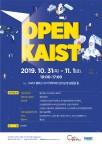
2019 Open KAIST
-
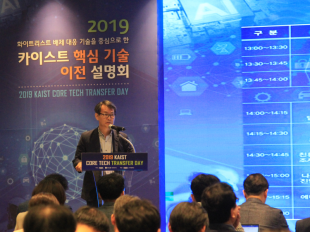
KAIST to Transfer Core Tech to Domestic Companies amid Japan..
< Associate Vice President Kyung-Cheol Choi of the Office of University-Industry Cooperation (OUIC) at KAIST > KAIST will transfer four core technologies related to materials, parts, and equipment to domestic companies to help them combat the latest export curbs triggered by Korea’s removal from Japan’s ‘white list’ of preferential trade partners. In addition, KAIST’s five patented technologies in the field of artificial intelligence (AI) and materials and parts will also be transferred to the companies in order to reduce the reliance on Japan and achieve technological independence through the ‘localization’ of key technologies. KAIST announced these university-industry cooperation promotion plans at the ‘2019 KAIST Core Tech Transfer Day Conference’ held in Seoul on September 17. More than 200 entrepreneurs and investors attended the briefing and on-site consulting sessions delivered by nine KAIST professors who led the development of the technologies. The four technologies were presented at the conference as those that can replace Japanese technologies subject to the export curbs. They include: 1. ‘Transparent fluorinated polyimide with low thermal expansion’ developed by Professor Sang-Youl Kim of the Department of Chemistry 2. ‘A non-destructive electromagnetic performance testing system’ developed by Professor Jung-Ryul Lee of the Department of Aerospace Engineering 3. ‘A nanotechnology-based electrode material for use in advanced secondary batteries’ developed by Professor Do-Kyung Kim of the Department of Materials Science and Engineering 4. ‘A high-resolution photoresist’ developed by Professor Emeritus Jin-Baek Kim of the Department of Chemistry. Of particular interest is the non-destructive electromagnetic performance testing system technology developed by Professor Jung-Ryul Lee. This new cost-effective technology enables tests that were impossible to carry out using conventional technologies and yields a cost reduction of more than 50 percent compared to foreign technologies. By introducing Professor Do-Kyung Kim’s new electrode material technology, the efficiency of electric vehicles can be increased. As this technology uses relatively low-cost sodium ion batteries, industries can prepare for the possible jump from the more expensive lithium batteries currently being used. Another five patented AI and materials and parts technologies disclosed at the conference include: 1. ‘Enhanced HTTP adaptive streaming with CNN-based super-resolution’ developed by Professor Dong-soo Han of the School of Electrical Engineering 2. ‘Method and apparatus of brain-computer interface design for estimating choice behavior and decision strategy’ developed by Professor Sang-Wan Lee of the Department of Bio and Brain Engineering 3. ‘Eco-friendly fabrication of metal oxide nanoparticles and fabrication of non-toxic polymer sunscreen ingredients by electron irradiation’ developed by Professor Sung-Oh Cho of the Department of Nuclear and Quantum Engineering 4. ‘High-density nanofiber yarn-based coloricmetric gas sensors’ developed by Professor Il-Doo Kim of the Department of Materials Science and Engineering 5. ‘Silicon-pocket energy storage electrode with high energy density and its manufacturing technology’ developed by Professor Jeung-Ku Kang of the Graduate school of EEWS. The patented nanofiber-based coloricmetric gas sensor technology developed by Professor Il-Doo Kim allows for the diagnosis of diseases by only using the patient’s respiration. Due to its high productivity and processability, it is expected to be applied to various fields in the fast-growing disease diagnosis sensor market, which includes mobile devices and wearable sensors. Moreover, Professor Dong-soo Han’s patented adaptive streaming technology attracted attention along with the ever-growing Over The Top (OTT) and Video On Demand (VOD) service markets, since it has significant potential for improving the streaming quality of videos and reducing costs for video providers. Professor Kyung-Cheol Choi, the Associate Vice President of the Office of University-Industry Cooperation (OUIC) at KAIST, said, “KAIST OUIC and KAIST Advisors on Materials and Parts (KAMP) have been working tirelessly to help Korean companies cope with the recent Japanese export restrictions. KAIST’s efforts will enhance the competitiveness and growth of the Korean industry and economy, turning this national crisis into opportunity.”
-
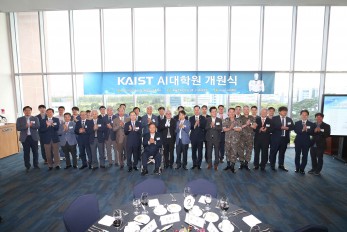
AI Graduate School to Take the Lead in Shaping the Future of..
(Dean Chung shows the plaque of the AI Graduate School with Vice Minister of Science and ICT Min during the opening ceremony on Aug.26) KAIST opened its AI Graduate School on August 26 with its first cohort of 22 Master’s and 10 PhD students for the 2019 fall semester. The new graduate school will provide students with a multidisciplinary curriculum incorporating the five key fields of healthcare, autonomous vehicles, manufacturing, security, and emerging technologies, and will offer 18 courses this semester. KAIST was selected as one of the first three AI graduate schools that the Korean government will financially endorse to nurture top-tier AI specialists. The government will provide 9 billion KRW and KAIST will invest an additional 4.2 billion KRW in the school over the next five years. KAIST aims to foster top-tiered AI engineers who will work for advancing emergent technologies for the Fourth Industrial Revolution. The school will produce original technologies by driving high-risk, innovative AI research projects and will be the main supplier of highly competent engineers who will lead the industry and advance the global market. KAIST has a long history of AI research and has a top-level AI education and research infrastructure. In 1990, KAIST launched the first AI research center in Korea. Since then, KAIST has taken the lead in the field by making breakthroughs in intelligent sensing information systems and AI platforms. About 20 percent of the faculty members at KAIST, or about 120 professors, are conducting AI-related research while offering 136 AI-related courses. The Dean of the AI Graduate School, Song Chong, said, “Our faculty members are the cream of the crop and are all in their early 40s. Although we started with only eight professors, we will employ 20 full-time professors by 2023 and will spare no effort to make the world’s best AI research hub and develop the brightest minds.” Dean Chung said that three professors are already listed in the top ten when measured by the number of publications from the top two AI conferences, Neural Information Processing System (NIPS) and ICML (International Conference on Machine Learning). KAIST has several highly recognized faculty members who have published more than 10 NIPS/ICML papers over nine years, winning numerous awards including the ACM Sigmetrics Rising Star Award, Google AI Focused Research Award, and INFORMS Applied Probability Best Publication Award. The number of students attempting to gain admission to the school is also very high. The admission office said that the percentage of applicants being offered admission stood at 9.1 percent. From next year, the school plans to increase the number of enrollments to 40 Master’s and 20 PhD students. The school will also open the AI Graduate School Research Center in Songnam City next month and expand its collaboration with local companies in the Songnam and Pangyo region, both emerging techno and ICT valleys. With the placement of 60 research personnel in the center, the school plans to play a leading role in building the companies’ technical competitiveness. (President Shin delivers welcoming remarks during the opening ceremony.) The government’s keen interest was well highlighted at the opening ceremony held at KAIST with the attendance of many dignitaries including the Mayor of Daejeon City Tae-Jong Huh, Vice Minister of Science and ICT Won-Ki Min, and National Assemblyman Sang-Min Lee. KAIST President Sung-Chul Shin stressed the importance of AI as a growth engine, saying, “AI will be a game changer and a key enabler of major industries. But the winner takes all in industry. Therefore, without producing the world’s top technology, we will not survive in the global market. To foster highly competitive specialists who will take the lead in this industry, we will educate students who can converge multiple disciplines and contribute to national growth and beyond in the years ahead.”
-
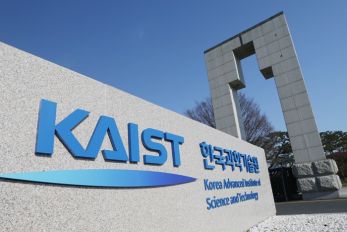
KAMP to Help SMEs Achieve Technological Independence
After the Japanese government dropped Korea from its ‘White List’ of favored trade partner status last week, KAIST launched an advisory group to help the SMEs that are expected to be the most affected by the decision. President Sung-Chul Shin announced on August 5 that KAIST is launching KAIST Advisors on Materials and Parts (KAMP), which is composed of 100 faculty members from five fields. President Shin said that KAIST would like to use this national crisis as an opportunity to make another leap forward by taking very timely and appropriate actions to help Korean SMEs achieve technological independence. Headed by the Vice Dean of the College Engineering, Sung-Yool Choi, KAMP will mainly advise in the fields of materials, parts, and equipment, which are crucial components for Korea’s key industries of semiconductors, energy, and automobiles. President Shin made the announcement following a meeting with senior leadership over the weekend. Faculty members including honorary professors from each committee’s department will be included as advisory group members. In the letter sent out to the entire faculty right after the meeting, President Shin stressed the roles and responsibilities of scientists and engineers, especially from KAIST, which was founded with the national mission to foster the scientists and engineers urgently needed to work for the nation’s industrialization and R&D. He also said, “We now take on our new calling to deal with technology hegemony in the midst of this crisis caused by the worsening tensions between the two countries.” He added, “Soldiers were the main force in the frontline protecting the country during the period in which the military ruled. However, in this era where technology reigns, especially in the face of the Fourth Industrial Revolution, scientists and engineers should come forward to the frontlines.” KAMP will be composed of the following five technology committees: - The Advanced Materials Committee led by the Head of the Department of Materials Science and Engineering - The Chemistry and Biology Committee led by the Head of the Department of Chemistry - The Chemical Engineering and Equipment Committee led by the Head of the Department of Chemical and Biomolecular Engineering - The Electronics and Computer Committee led by the Head of the School of Electrical Engineering - The Machinery and Aerospace Committee led by the Head of Department of the Mechanical Engineering KAMP will support the development of 159 key technologies out of the 1,194 on the affected list. To promptly respond to the SMEs’ technological challenges, KAMP will designate an exclusive advisor based on the technological challenges they are experiencing. Serving as emergency tech service providers, KAMP will identify and analyze the problems and will systematically manage the problem-solving procedures. In close collaboration with the Office of University-Industry Cooperation, KAMP will drive the innovative growth of Korea and will help it become highly technologically competitive and independent in the fields of key materials, parts, and equipment. President Shin said the university will make every effort institutionally and financially to make this advisory group’s work successful. For SMEs who wish to use the KAMP advisory service, call +82-(0)42-350-6119 or send an email to smbrnd@kaist.ac.kr. < Head Advisor of KAMP Sung-Yool Choi providing advisory service to SMEs >
-
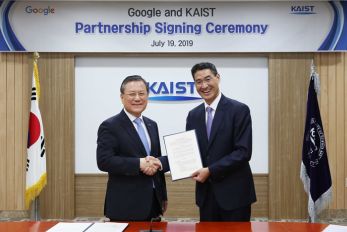
KAIST-Google Partnership for AI Education and Research
(President Shin shakes hands with John Lee, country director of Google Korea after signing the collaboration agreement on July 19 at KAIST.) Google has agreed to support KAIST students and professors in the fields of AI research and education. President Sung-Chul Shin and Google Korea Country Director John Lee signed the collaboration agreement during a ceremony on July 19 at KAIST. Under the agreement, Google will fund the Google AI-Focused Research Awards Program, the PhD Fellowship Program, and Student Travel Grants for KAIST. In addition, Google will continue to provide more academic and career building opportunities for students, including Google internship programs. KAIST and Google has been collaborating for years. Professor Steven Whang at the School of Electrical Engineering and Professor Sung Ju Hwang at the School of Computing won the AI-Focused Award in 2018 and conduct their researches on "Improving Generalization and Reliability of Any Deep Neural Networks" and "Automatic and Acitionable Model Analysis for TFX," respectively. Outstanding PhD students have been recognized through the PhD Fellowship Program. However, this new collaboration agreement will focus on research, academic development, and technological innovation in AI. Google plans to support research in the fields of deep learning, cloud machine learning, and voice technologies. Google will fund the development of two educational programs based on Google open source technology each year for two years that will be used in the new AI Graduate School opening for the fall semester. John Lee of Google Korea said, “This partnership lays a solid foundation for deeper collaboration.” President Shin added, “This partnership will not only advance Korea’s global competitiveness in AI-powered industries but also contribute to the global community by nurturing talents in this most extensive discipline.”
-
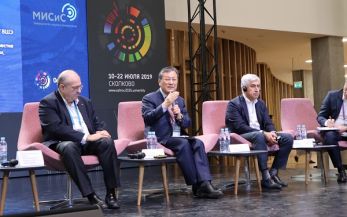
President Shin Shares Innovation Strategy at Moscow
(President Shin engages in discussion during the Island 10-22 Conference held at Skoltech in Moscow.) President Sung-Chul Shin shared the recipe for success for rapid national development through university education during the Island 10-22 Conference held at the Skolov Institute of Science and Technology in Moscow on July 16. President Shin stressed how urgent it is for higher education to rapidly embrace the new global economic environment brought about by the Fourth Industrial Revolution in his keynote address entitled ‘Roles and Responsibilities of Universities for Rapid National Development’. The Island 10-22 Conference is a summit co-organized by the National University of Science and Technology MISIS and University of the National Technological Initiative 2035 and supported by the Ministry of Science and Higher Education of the Russian Federation. More than 30 world-renowned experts, presidents of leading technological universities including President Peretz Lavie from the Israel Institute of Technology Technion, President Scott Pulsipher from Western Governors University and specialists in big data participated in the conference as speakers and discussed a diverse spectrum of ideas for making innovations and digital transformations in universities. More than 1,600 participants joined the conference. During his keynote speech, President Shin explained how Korea has achieved such rapid economic growth over the past half century. He cited the Korean government’s vision and innovation policies as factors leading to Korea’s phenomenal success. KAIST, one of the results of the Korean government’s innovation policy, led the nation to advanced technological breakthroughs in industries such as semiconductors. Such visionary policies and investments in science, technology, and education eventually made the Korea of today possible. President Shin said that KAIST distinguished itself through its new vision of C3 that fosters intellectual creativity, caring for others, and a challenging mind . Under Vision 2031, a blueprint for becoming a leading global university, President Shin said the KAIST continues to strive for innovations in convergent education,research and entreprenurship.
-
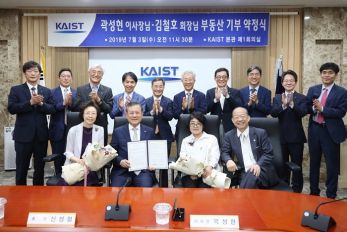
It’s a Blessing: Lawyer Couple Donates 82 Acres of Land
(From right: International IP Alternative Dispute Resolution Center (IIPAC) Chairman Kim Cheol-ho, his wife Korea Abraham Lincoln Society Founder Kwak Sung-hyun, President Shin and Mrs Shin) Korea Abraham Lincoln Society Founder Kwak Sung-hyun and International IP Alternative Dispute Resolution Center (IIPAC) Chairman Kim Cheol-ho have committed to donate a large tract of land to KAIST during a ceremony on July 3. The couple will donate about 82 acres of land located in Seongnam City, Gyeonggi Province. The value of the property is estimated at over 10 billion won. Kim, a lawyer who taught at the Moon Soul Graduate School of Future Strategy from 2009 to 2014, said, “It is a real blessing to make a gift to KAIST." The property is a part of family inheritance that has been passed down for generations. “We’ve thought about the right way to give back to society from a long-term perspective. KAIST will be the best place to honor my father’s generosity and spirit to help young students,” Kwak said at the ceremony. Kwak’s late father who was also a lawyer was a big landowner in Seongnam City back in the 1970s. But he also had to buy nearby parcels of land because he could not refuse the local farmers asking him to buy their land when they urgently needed to sell their property to pay their children’s college tuition fees. So, he bought the land, paying more than double the asking price. The couple finalized their donation plan after having a meeting with President Sung-Chul Shin earlier this year. President Shin personally guided them on a campus tour and presented his vision to make KAIST a world-class university. “We were quite moved by President Shin and the faculty members’ passion and hard work. And we really wanted to help KAIST be the real top university in the world by educating young talents needed for the new era,” Kim said. President Shin said the university will use the land to establish a new campus for entrepreneurship that combines education, research, and technology commercialization so that it can become an advance base in the Fourth Industrial Revolution era.

